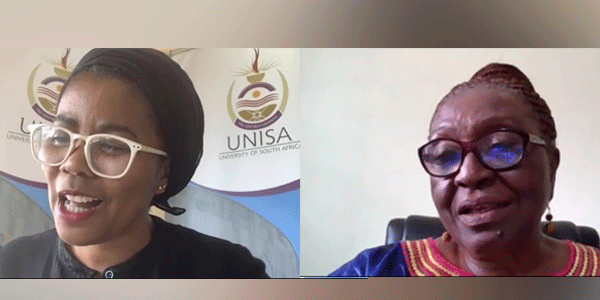Harnessing Africa’s knowledge tank
- Wits University
African universities have great potential to accelerate development and advance knowledge on the continent.
This is despite the challenges facing universities today such as funding and access to higher education, which were exacerbated by the onset of the Covid-19 pandemic.
Leading African female academics expounded on these challenges and solutions to develop competitive African universities during a panel discussion titled, African conversations on the future of higher education on 25 October. Professor Ruksana Osman, Senior Deputy Vice-Chancellor: Academic facilitated the discussion.
Professor Ameena Gurib-Fakim, former Pro Vice-Chancellor of the University of Mauritius, and the sixth Honourable State President of Mauritius and its first female president said Africa must invest in its education systems to transform the continent because “quality education are prime movers of growth and development.”
“Primary education offers an unprecedented opportunity as sustained growth is the first of several opportunities. I am convinced that the social and economic transformation will happen only when higher education, better access to healthcare and greater emphasis on knowledge become central to the development debate,” she said.
Nurturing young talent for transformation
Garib-Fakim emphasised that Africa’s young talent needs to be capacitated to enable them to solve Africa’s problems and achieve socio-economic transformation. She added that channelling the increasing reservoir of human capital would yield economic benefits because “Africa’s greatest potential is its people.”
“Shared growth can be achieved when the new generations of talented and ambitious young Africans are healthy, fully equipped with the right skills, knowledge and competencies that will enable them to formulate and implement African solutions for African challenges.
She implored on participants to be active citizens who challenge the status quo and strive for equity.”
“Africa’s demographic division cannot be realised without enhanced equity and representation across society including senior academic division. The system won’t reform itself without being challenged to change its status quo by policy makers, institutional governance and a growing body of female academics, putting themselves forward and taking up their seats in the boardrooms of academia, ”said Garib-Fakim.

Prioritise female academics
Building knowledge and research capacity should be imperative for African universities to develop quality higher education in Africa. To achieve this, “research policy in African universities must be reviewed in order to identify and create knowledge not only for innovations in transformative education for the 21st Century but also to create an African-Centric landscape education in university settings for relevance and meaningfulness in content and research to sustain African values and develop appropriate skills,” said Professor Theresa Tchombe, Honorary Dean in the Faculty of Education at the University of Buea in Cameroon.
Tchombe, whose areas of research include cognitive development, inclusive education, learning, gender and teacher education said as part of building research capacity, female academics must be prioritised and provided with adequate resources to achieve their research goals.
She added that collaborative and multidisciplinary research could strengthen research capacity in Africa and create opportunities for lecturers and students to gain exposure to global learning contexts.
Adding her remarks, Professor Puleng LenkaBula, Principal and Vice-Chancellor of the University of South Africa, said African universities should be evaluated by how Africans experience them. LenkaBula highlighted that universities are social institutions where knowledge is researched, engaged with and articulated, and where students develop as intellectuals.
“The questions around the roles, functions, relevancy and transformations associated with universities have always been critical or central to the reimagination around the relevance of universities. In this context, the relevancy of the university is important because we exist in the context where the shifts and transformations in the present and key amongst them are the renewed global economic crisis and the desperate experiences of the economy and ecology, which amongst others are important in thinking about universities.”
LenkaBula said although Covid-19 presented opportunities for universities to explore digital technologies and invest in online learning, it has affected the institutional cultures important to the identity of universities.
While this is an area of concern, other challenges precede this as the continent strives for excellence within its higher education sector.
“In Africa, we are not only worried about access but worried about access with success. We are also concerned about success rates, the research outputs as well as the decolonisation of the university.”
Reimagining education in the digital era
Palesa Mofokeng, a Masters in Educational Technology candidate at Wits and lecturer at Rosebank College elucidated enabling access to higher education through digital transformation, new digital technologies and pedagogies.
The global pandemic called for lecturers and students to adapt to online teaching and learning as the primary mode of learning.
Mofokeng said digital technologies and learning management systems such as Sakai, Moodle, Blackboard, which enabled online learning had always been available and used in institutions of higher learning. Covid-19 reinforced this mode of teaching and learning, said Mofokeng.
“In an attempt to enable access to higher education through digital transformation, new digital technologies and pedagogies, we need to reimagine our mainstream, basic education system in South Africa and the continent at large. We need to start at that level. Covid-19 as black swan, exposed the digital divide within most, if not all, South African and African township and rural schools,” she said.
Mofokeng, who is a former Wits SRC Academic Officer stressed that to enable access to universities, the education system should and must be reimagined to address the prevailing societal ills inclusive of inequality and exclusion.

